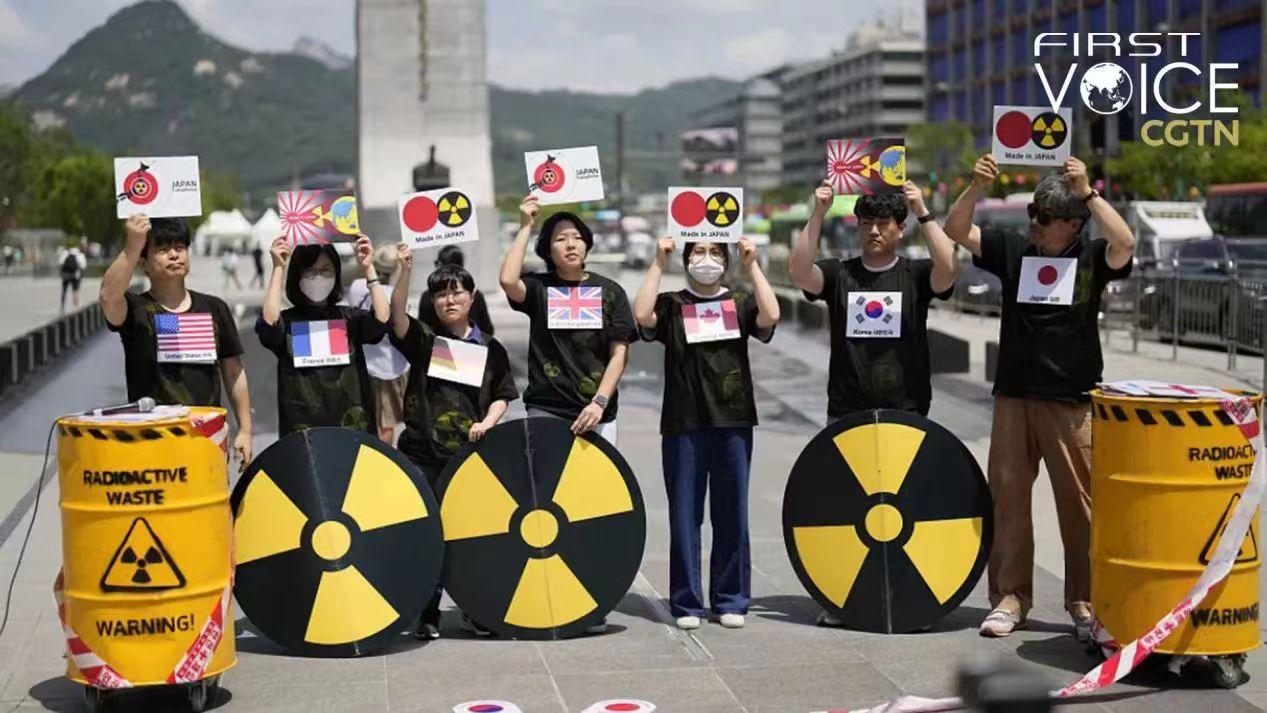
Editor's note: CGTN's First Voice provides instant commentary on breaking stories. The column clarifies emerging issues and better defines the news agenda, offering a Chinese perspective on the latest global events.
Born into a family hailing from Hiroshima, Japanese Prime Minister Fumio Kishida recently said in an interview with American magazine TIME that the "unspeakable devastation" experienced by locals after the nuclear explosion was "inscribed vividly in my memory." so he hopes to work toward "a world without nuclear weapons."
However, Kishida's "nuclear memory" is quite selective as his administration has intended to persuade the G7 to consent to their proposal to discharge the contaminated water from the Fukushima Daiichi nuclear power station into sea, which the Japanese government claimed would be "safe" and "rational."
In fact, since the country announced this decision in April 2021, the voices of strong opposition from all walks of life in both Japan and abroad have never ceased. But the Japanese government, knowing that its decision is unwelcomed, still insists on going its own way, repeatedly testing the bottom line of the international community.
Prior to the G7 summit, Japan even planned to arrange a food catering show on the first day of the meeting, where they would serve political leaders from various countries a working meal made with ingredients from Fukushima, the area affected by the "nuclear leak," in order to receive endorsement from the participating countries for the Fukushima water discharge plan.
However, the government finally gave up their "nuclear food" plan and changed to Hiroshima and Seto seafood, according to the Ministry of Foreign Affairs of Japan. Maybe they were worried about the "indigestion" brought about by "nuclear food."
German Federal Minister of the Environment Steffi Lemke has made it clear that she "cannot welcome the release of the treated water," as Japanese newspaper Asahi Shimbun reported. South Korea, although in the diplomatic "honeymoon phase" with Japan, also recently saw large-scale demonstrations as people in Seoul unfurled banners and shouted "oppose the G7 countries allowing the release of Fukushima nuclear-contaminated water."

People rally to protest against Japan's planned discharge of radioactive wastewater into the Pacific Ocean in Seoul, ROK, May 20, 2023. [Photo/Xinhua]
The Pacific Islands Forum, of which the members include Australia and New Zealand, also jointly called on Japan to immediately give up on their plan to dump the contaminated water into the Pacific Ocean.
In fact, what makes the international community even more puzzled is that why has Japan, a country that has suffered from nuclear radiation and pollution disasters, chosen omission over mitigation? Why does Japan adopt an evasive attitude and refuse to fulfill its due responsibilities and obligations on an issue with such a huge international influence?
During the G7 Summit, Kishida talked eloquently about the sustainable development of the world, but outside the summit, Japan tried to use "safety" as an excuse to discharge nuclear contaminated water into the ocean. How can such a move be considered "sustainable?"
Shaun Burnie, a British nuclear specialist in the field of environmental protection, said that Japan's decision ignores "science, environmental protection and international law." The claim that it is safe to filter and dilute nuclear-contaminated water and discharge it into the sea is "obviously scientifically untenable." This plan seriously violates the United Nations Convention on the Law of the Sea (UNCLOS) and is completely "unacceptable."
The Japanese government has been claiming that the treated water is safe, eager to discharge the water into the ocean shared by mankind. This can't help but make people wonder: Why doesn't Japan discharge the nuclear-contaminated water domestically, or use it as water for agriculture and industry?
The "nuclear" imprint of hegemonic countries remains in people's mind. The vast Pacific Ocean is still digesting the environmental and health bitterness of the nuclear tests conducted by the U.S.-led G7 countries during the Cold War. If the Japanese government really dumps nuclear-contaminated water into the sea, it will undoubtedly create a "maritime Chernobyl," which will bring huge disasters to the already fragile ecosystems of the world.
While Japan has been showcasing its "care" for environmental protection, peace, and development, it has, on the other hand, insisted on conducting such a plan that harms the world and benefits itself. Should it be ashamed?

 中文
中文



